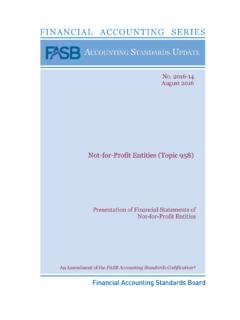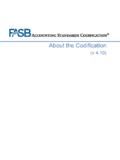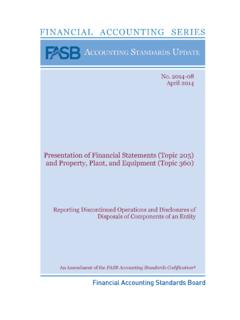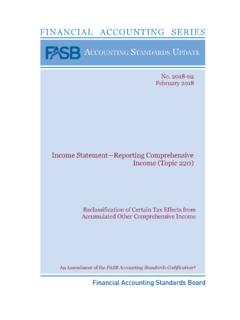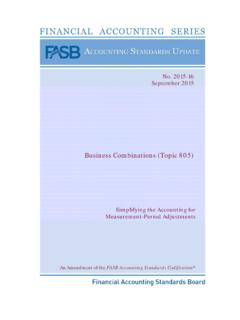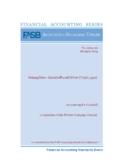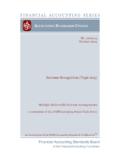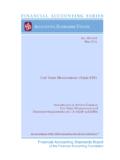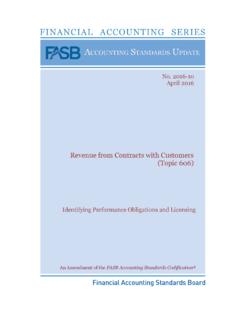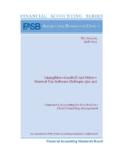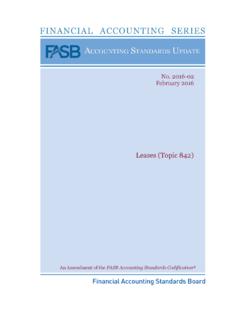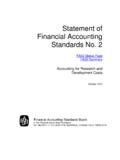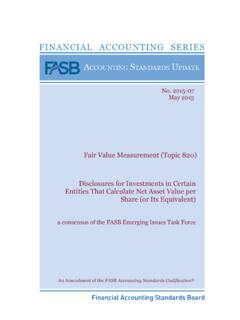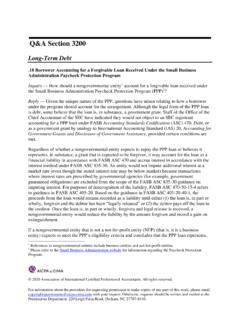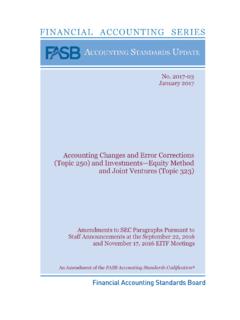Transcription of Compensation—Stock Compensation (Topic 718) - FASB
1 Compensation Stock Compensation (Topic 718) No. 2016-09 March 2016 Improvements to Employee Share-Based Payment Accounting An Amendment of the FASB Accounting Standards Codification The FASB Accounting Standards Codification is the source of authoritative generally accepted accounting principles (GAAP) recognized by the FASB to be applied by nongovernmental entities. An Accounting Standards Update is not authoritative; rather, it is a document that communicates how the Accounting Standards Codification is being amended. It also provides other information to help a user of GAAP understand how and why GAAP is changing and when the changes will be effective. For additional copies of this Accounting Standards Update and information on applicable prices and discount rates contact: Order Department Financial Accounting Standards Board 401 Merritt 7 PO Box 5116 Norwalk, CT 06856-5116 Please ask for our Product Code No.
2 ASU2016-09. FINANCIAL ACCOUNTING SERIES (ISSN 0885-9051) is published monthly with the exception of January and October by the Financial Accounting Foundation, 401 Merritt 7, PO Box 5116, Norwalk, CT 06856-5116. Periodicals postage paid at Norwalk, CT and at additional mailing offices. The full subscription rate is $255 per year. POSTMASTER: Send address changes to Financial Accounting Standards Board, 401 Merritt 7, PO Box 5116, Norwalk, CT 06856-5116. | No. 433 Copyright 2016 by Financial Accounting Foundation. All rights reserved. Content copyrighted by Financial Accounting Foundation may not be reproduced, stored in a retrieval system, or transmitted, in any form or by any means, electronic, mechanical, photocopying, recording, or otherwise, without the prior written permission of the Financial Accounting Foundation.
3 Financial Accounting Foundation claims no copyright in any portion hereof that constitutes a work of the United States Government. An Amendment of the FASB Accounting Standards Codification No. 2016-09 March 2016 Compensation Stock Compensation (Topic 718) Improvements to Employee Share-Based Payment Accounting Accounting Standards UpdateFinancial Accounting Standards Board Accounting Standards Update 2016-09 Compensation Stock Compensation (Topic 718) Improvements to Employee Share-Based Payment Accounting March 2016 CONTENTS Page Numbers Summary .. 1 3 Amendments to the FASB Accounting Standards Codification .. 5 105 Appendix: Paragraphs Amended by Multiple Simplification Issues.
4 106 110 Background Information and Basis for Conclusions .. 111 120 Amendments to the XBRL Taxonomy .. 121 1 Summary Why Is the FASB Issuing This Accounting Standards Update (Update)? The Board is issuing this Update as part of its Simplification Initiative. The objective of the Simplification Initiative is to identify, evaluate, and improve areas of generally accepted accounting principles (GAAP) for which cost and complexity can be reduced while maintaining or improving the usefulness of the information provided to users of financial statements. The areas for simplification in this Update were identified through outreach for the Simplification Initiative, pre-agenda research for the Private Company Council, and the August 2014 Post-Implementation Review Report on fasb statement No.
5 123(R), Share-Based Payment. Who Is Affected by the Amendments in This Update? The amendments in this Update affect all entities that issue share-based payment awards to their employees. What Are the Main Provisions and How Do They Differ from Current Generally Accepted Accounting Principles (GAAP)? The areas for simplification in this Update involve several aspects of the accounting for share-based payment transactions, including the income tax consequences, classification of awards as either equity or liabilities, and classification on the statement of cash flows. Some of the areas for simplification apply only to nonpublic entities. Current GAAP Summary of Simplifications Accounting for Income Taxes: An entity must determine for each award whether the difference between the deduction for tax purposes and the Compensation cost recognized for financial reporting purposes results in either an excess tax benefit or a tax deficiency.
6 Excess tax benefits are recognized in additional paid-in capital; All excess tax benefits and tax deficiencies (including tax benefits of dividends on share-based payment awards) should be recognized as income tax expense or benefit in the income statement. The tax effects of exercised or vested awards should be treated 2 Current GAAP Summary of Simplifications tax deficiencies are recognized either as an offset to accumulated excess tax benefits, if any, or in the income statement. Excess tax benefits are not recognized until the deduction reduces taxes payable. as discrete items in the reporting period in which they occur. An entity also should recognize excess tax benefits regardless of whether the benefit reduces taxes payable in the current period.
7 Classification of Excess Tax Benefits on the Statement of Cash Flows: Excess tax benefits must be separated from other income tax cash flows and classified as a financing activity. Excess tax benefits should be classified along with other income tax cash flows as an operating activity. Forfeitures: Accruals of Compensation cost are based on the number of awards that are expected to vest. An entity can make an entity-wide accounting policy election to either estimate the number of awards that are expected to vest (current GAAP) or account for forfeitures when they occur. Minimum Statutory Tax Withholding Requirements: One of the requirements for an award to qualify for equity classification is that an entity cannot partially settle the award in cash in excess of the employer s minimum statutory withholding requirements.
8 The threshold to qualify for equity classification permits withholding up to the maximum statutory tax rates in the applicable jurisdictions. Classification of Employee Taxes Paid on the Statement of Cash Flows When an Employer Withholds Shares for Tax-Withholding Purposes: There is no guidance on classification of cash paid by an employer to the taxing authorities when directly withholding shares for tax-withholding purposes. Cash paid by an employer when directly withholding shares for tax-withholding purposes should be classified as a financing activity. Practical Expedient Expected Term: Entities are required to estimate the period of time that an option will be outstanding. A nonpublic entity can make an accounting policy election to apply a practical expedient to estimate the expected term for all awards with performance or service conditions that meet certain conditions.
9 3 Current GAAP Summary of Simplifications Intrinsic Value: At initial adoption of Topic 718, Compensation Stock Compensation , nonpublic entities were provided an option to measure all liability-classified awards at intrinsic value. Some nonpublic entities were not aware of that option. A nonpublic entity can make a one-time accounting policy election to switch from measuring all liability-classified awards at fair value to intrinsic value. In addition to those simplifications, the amendments eliminate the guidance in Topic 718 that was indefinitely deferred shortly after the issuance of fasb statement No. 123 (revised 2004), Share-Based Payment. This should not result in a change in practice because the guidance that is being superseded was never effective.
10 When Will the Amendments Be Effective and What Are the Transition Requirements? For public business entities, the amendments in this Update are effective for annual periods beginning after December 15, 2016, and interim periods within those annual periods. For all other entities, the amendments are effective for annual periods beginning after December 15, 2017, and interim periods within annual periods beginning after December 15, 2018. Early adoption is permitted for any entity in any interim or annual period. If an entity early adopts the amendments in an interim period, any adjustments should be reflected as of the beginning of the fiscal year that includes that interim period. An entity that elects early adoption must adopt all of the amendments in the same period.
